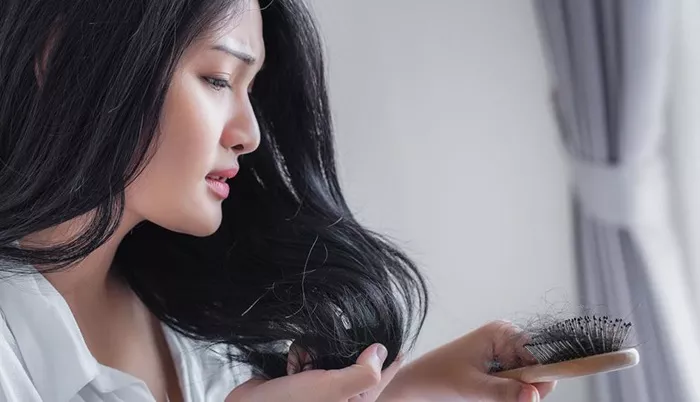Hair loss can be a distressing experience for many people. It can affect self-esteem and confidence. However, there are ways to prevent and manage hair loss effectively. Here are 15 best ways to avoid hair loss, with practical tips and simple steps.
15 Best Ways to Avoid Hair Loss
1. Maintain a Balanced Diet
A healthy diet is crucial for hair health. Your hair needs nutrients to grow and stay strong.
Eat Protein-Rich Foods: Hair is made of keratin, a type of protein. Include eggs, fish, meat, and beans in your diet.
Consume Iron: Iron deficiency can lead to hair loss. Eat spinach, red meat, and lentils.
Include Omega-3 Fatty Acids: These are found in fish like salmon and flaxseeds. They help nourish hair.
Vitamins and Minerals: Vitamin A, C, and E, along with zinc and selenium, support hair health. Eat a variety of fruits and vegetables.
See also: The Ultimate Guide to 15 Foods That Help Hair Grow
2. Avoid Harsh Hair Treatments
Exposing your hair to harsh treatments can weaken it.
Limit Heat Styling: Excessive use of blow dryers, curling irons, and straighteners can damage hair.
Chemical Treatments: Reduce the use of dyes, bleaches, and perms. They can strip hair of its natural oils.
Gentle Handling: Be gentle when brushing or styling. Avoid tight hairstyles that pull on hair roots.
3. Use Mild Hair Products
Choosing the right hair products is essential.
Mild Shampoos: Use shampoos that are free from sulfates and parabens. These chemicals can be harsh on your scalp and hair.
Condition Regularly: Condition your hair to keep it hydrated. Look for conditioners with natural ingredients.
Avoid Alcohol-Based Products: These can dry out your hair and scalp.
4. Keep Your Scalp Healthy
A healthy scalp is the foundation for healthy hair.
Regular Washing: Wash your scalp regularly to remove dirt and excess oil.
Scalp Massage: Massage your scalp gently to improve blood circulation. This can promote hair growth.
Avoid Tight Hats: Wearing tight hats can cause friction and lead to hair breakage.
5. Reduce Stress
Stress can lead to hair loss. Managing stress is important for overall health and hair health.
Relaxation Techniques: Practice yoga, meditation, or deep breathing exercises.
Physical Activity: Regular exercise can reduce stress and improve blood flow to the scalp.
Adequate Sleep: Ensure you get enough sleep. Lack of sleep can contribute to stress and hair loss.
6. Stay Hydrated
Drinking enough water is vital for maintaining healthy hair.
Daily Water Intake: Aim for at least 8 glasses of water a day.
Hydrating Foods: Eat water-rich foods like cucumbers, oranges, and watermelons.
7. Avoid Smoking
Smoking can have a negative impact on hair health.
Quit Smoking: Smoking reduces blood flow to the scalp, affecting hair growth.
Avoid Secondhand Smoke: Exposure to secondhand smoke can also harm your hair.
8. Regular Hair Trims
Trimming your hair regularly helps maintain its health.
Prevent Split Ends: Regular trims prevent split ends from traveling up the hair shaft.
Promote Healthy Growth: Trimming gets rid of damaged hair, promoting healthier growth.
9. Protect Hair from Sun Damage
Just like skin, hair can get damaged from excessive sun exposure.
Wear Hats: Protect your hair by wearing hats when you are out in the sun.
UV Protection Products: Use hair products that offer UV protection.
10. Avoid Excessive Hair Washing
Washing hair too often can strip it of natural oils.
Frequency: Wash your hair 2-3 times a week. Adjust based on your hair type.
Dry Shampoo: Use dry shampoo between washes to keep your hair fresh.
11. Be Gentle When Wet
Wet hair is more vulnerable to damage.
Pat Dry: Gently pat your hair dry with a towel instead of rubbing.
Wide-Tooth Comb: Use a wide-tooth comb to detangle wet hair gently.
12. Choose the Right Hairbrush
The type of hairbrush you use can affect your hair health.
Natural Bristles: Use brushes with natural bristles for a gentle touch.
Avoid Plastic Brushes: Plastic bristles can create static and cause breakage.
13. Avoid Tight Hairstyles
Tight hairstyles can put stress on hair and scalp.
Loose Styles: Opt for loose hairstyles that don’t pull on your hair.
Change Hairstyles: Avoid wearing the same hairstyle every day to reduce strain on specific areas.
14. Use Natural Oils
Natural oils can nourish your hair and scalp.
Coconut Oil: This oil penetrates the hair shaft and provides deep conditioning.
Argan Oil: Rich in antioxidants, it helps repair and hydrate hair.
Jojoba Oil: It mimics natural scalp oils and can help with dry scalp conditions.
15. Seek Professional Advice
If you experience significant hair loss, seek professional help.
Consult a Dermatologist: A dermatologist can help diagnose the cause of hair loss.
Follow Medical Advice: Adhere to any treatment plans or medications prescribed by your doctor.
Regular Check-Ups: Regular follow-ups can help monitor your progress and adjust treatments as needed.
Conclusion
Preventing hair loss involves a combination of a healthy lifestyle, proper hair care, and sometimes professional intervention. By following these 15 best ways, you can take proactive steps to maintain your hair’s health and reduce the risk of hair loss. Remember, consistency is key, and making small changes can lead to significant improvements over time. Take care of your hair, and it will continue to look and feel its best.
You May Be Interested In

